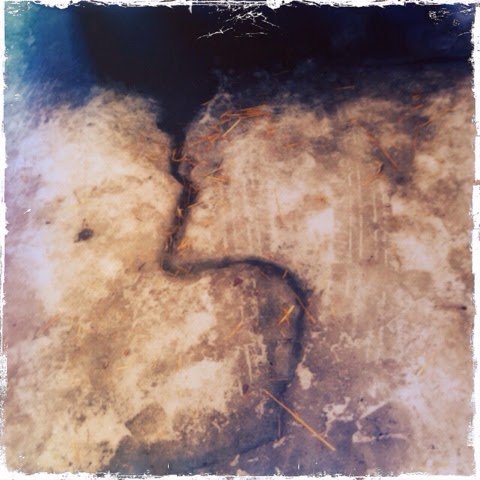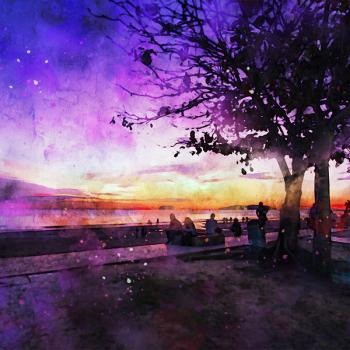In my last post I shared a spring tradition that my Grove has built over the years. It’s one tradition, certainly not the only one. It is crucial that we as modern pagans take the time and effort to think about how our paganism fits into the world we find ourselves in.
As the winter snow begins to melt and I find myself deeply breathing the fresh smell of spring, the Earth Mother is close to my thoughts. If we see the sacred embodied in the world around us how do we functionally embody that? In other words, if we believe that the Earth is our Sacred Mother, what the heck do we do about it?
I’ve spent more than a decade pondering that question from spiritual, physical, and mental standpoints. I’ve tried a lot of things. I’ve studied organic farming, climate change, ecopsychology, ecology, herbalism, and deep ecology. I’ve read the writings of Joanna Macy, E.O. Wilson, David Abram, Eliot Coleman, and John Jeavons. They’re all worth checking out.
For me, it has come down to living in harmony. The Lithuanians have a word: darna. It means harmony, balance, and is spoken of as a way of life. We humans are not in balance. Not with each other, not with the other species, not with the Earth Mother herself. We are immensely powerful, capable of destroying not only ourselves but everyone else we share our lovely blue planet with. This is a hard thought to hang onto. It’s painful, and mostly we are kept busy with making sure the kids are fed and taken to the dentist, the boss is satisfied with our work, and if we are lucky, some measure of joy and pleasure for ourselves is to be found. But there are things we can do, and must do, even within that matrix of meaningful work.
In my reading this morning I came across a post over at House of Vines about how to honor the gods of place. His focus was on the challenges of working with local spirits and gods while respecting the rights of indigenous people, in particular, Native American traditional religion. As I took my daughters to school my youngest pointed out a rivulet that had formed in the melting ice. I thought about how it looked like a real river, seen from far above and how the microcosm truly does reflect the macrocosm.
And within that image is the answer to the question, “What the heck do we do about it?”
Each of us is ultimately responsible for our own actions. It is up to us as individuals to find our own unique way to walk in balance and honor the spirits of the land. However, having studied the project for some years I have some ideas of what works and what doesn’t. So without further ado I present you with seven ideas for how to live closer in harmony with the earth and the land spirits.
- 1. Food. Food is basic in our lives, everyone needs it, and food is literally what we are built from. Cook your own. Learn to cook from scratch. Worry less about if food is organic and more about if it’s local. Go to farmers markets and make friends with farmers. Grow your own if you can. Look for signs in the grocery store that tell you where the food is from and pick close to home. I know all this education and cooking takes time. I could go on and on about food. I’ve tried a lot of diets: vegetarian, raw food, whole grain, gluten-free, and corn-free. Finally I went paleo and stayed there. It works really well with local eating. We have a milk and meat share we get weekly from a farmer north of town. Make food a priority for you, your family, and your Earth.
- 2. Travel. Let’s face it. Petrochemicals are a big part of the human power imbalance, right? Gas leads to hydrocarbons, leads to climate change, leads to Bad Things. However, I’m not suggesting that you stop traveling, but I do believe that we should think about a hierarchy of travel. Walking and biking should soon become a more viable option in the northern hemisphere. I intend to walk my youngest home from school today. However, when we travel longer distances, remember that even though a car takes longer, from an ecological standpoint it’s way better to drive than to fly. Make the extra effort to rideshare or take a train or bus if you can. A good rule of thumb is that the slower you go the better it is. Make the journey part of the adventure.
- 3. Stuff. I’m not advocating just getting rid of all of it and going to sit on the top of a mountain in a cave somewhere. I am saying we need to think about our stuff. In years past people had stuff that could make stuff. Their collections weren’t of action figures, but of tools. They could knit, or make furniture. They could do things with their stuff, and stuff had purpose. I would argue that your stuff should have a purpose too. Ideally stuff should be functional, beautiful, and useful.
- 4. Community. For a human, to walk in balance is for us to have community. We are social animals, and at our best we support each other and share our successes and failures. You don’t have to do everything on your own. Walking in balance with the Earth Mother involves time and effort. It is time and effort well spent, with dividends paid in the lives of our children, their children, and all the lives of the species we share our world with. Finding people to do it with you will help. You can share techniques, you can share the work, and you can share the joy as well.
- 5. Simplicity. This is one of those concepts that is easy to say and hard to do. Community can certainly play into making it easier, because it’s so much harder to find contentment in your life alone. Simplicity is about enjoying what is there around you, noticing the first blossoms of spring, taking pleasure in a favorite sweater, listening to a friend share a poem or a joke. Live where you are and find the beauty in that place and those people. It’s there.
- 6. Diversity. Value diversity in every aspect of your life. Right now in the US most of the potatoes grown are one kind of potato. This makes our food system very fragile. Buy weird colored potatoes. Remember that there are always more than two answers and that most dichotomies are false. Put value on the importance of different ideas and different people. Monotheism leads to the belief that there is one right answer and one right way. Ecology shows us that there are a multitude of ways to solve any problem. Value people of different skin colors because humans are beautiful in all our colors. Be polytheist in practice because it makes you more compassionate, flexible, and wise.
- 7. Time. My husband once told me that the only limiting resource we really have is time. After thinking about it for a while I realized that he was right. What this means is that I am asking you to take your most valuable resource and spend it differently. Take some time for the Earth. I’m not just asking you to do this for yourself, but for your children and for mine too. Think about how you could walk in balance with the earth and take the time to make sure your answer will really work. Don’t give into greenwashing by companies who want to sell you things. Do work to learn useful skills, integrate knowledge into your daily life, and take the time to notice the goddess that is always with us: the Earth Mother.


















